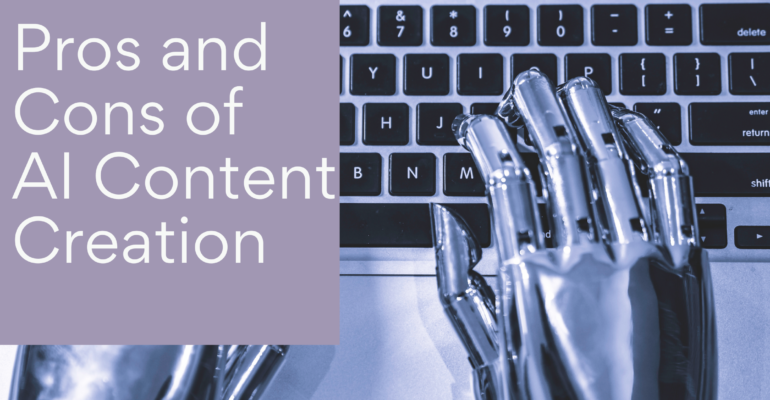Pros and Cons of Using AI for Content Creation
October 12, 2023 2023-10-12 8:38Pros and Cons of Using AI for Content Creation
Pros and Cons of Using AI for Content Creation
By now I’m sure you’ve heard a little (or a lot) about the major role that artificial intelligence (AI) has in revolutionizing the marketing and operation of small businesses. When it comes to content creation AI presents a powerful solution to what can often be time-consuming and not-so-fun work for entrepreneurs.
With AI technology in its current state, it’s best to use AI content writers as writing assistants, rather than relying on them to do all the work for you. Of course, technology is changing by the minute, and there may come a time soon when AI programs can mimic you or your brand’s personal style of writing to create even more value. However, for now, we get the most value out of AI content creators by using them to craft info-heavy first drafts that we can put a human touch on later.
To demonstrate both the power of these tools and their limitations, here is a list of some of the pros and cons of using AI to create content, written by Chat GPT.
Prompt: 500 words on the benefits and limitations of AI content creation
Benefits:
Increased efficiency: AI can analyze data and generate content much faster than humans, allowing businesses to produce more content in less time. This can help businesses keep up with the demand for fresh, relevant content and improve their online presence.
Improved accuracy: AI can analyze data with a high level of accuracy and attention to detail, which can lead to more accurate and reliable content. This can be especially useful for generating technical or scientific content, where small errors can have significant consequences.
Cost-effective: AI content creation can be more cost-effective than hiring human writers, as it can reduce the need for labor and editing. This can be especially beneficial for businesses on a tight budget.
Customization: AI can tailor content to specific audiences or markets, allowing businesses to create personalized, targeted content. This can improve the relevance and effectiveness of their marketing efforts.
Limitations:
Lack of creativity: While AI can generate high-quality content, it may lack the creativity and originality of human writers. This can limit its ability to produce unique, engaging content that stands out in a crowded market.
Limited understanding of context: AI may struggle to understand the nuances and subtleties of human language and communication, leading to content that lacks depth or coherence. This can make it difficult for AI-generated content to connect with readers on an emotional level.
Ethical concerns: Some people have raised concerns about the ethical implications of using AI to create content, such as the potential for biased or misleading information to be generated. This can be a particular concern for businesses that rely on AI for content creation, as it may be difficult for them to ensure the accuracy and integrity of their content.
Dependency: Relying heavily on AI for content creation can lead to a dependence on technology, which can be risky if the AI system experiences an outage or malfunction. Businesses should have contingency plans in place to ensure that they can continue to produce high-quality content in the event of a disruption.
Overall, AI has the potential to significantly improve the efficiency and accuracy of content creation, but it is important to consider the limitations and ethical concerns when using it. While AI can be a valuable tool, it should be used in conjunction with human oversight and judgment to ensure the quality and integrity of the content being produced.
Are you ready to use AI in your business marketing? Let us know.










